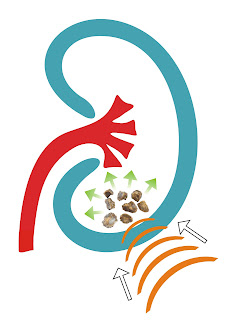As the kidneys channel squanders from the blood, they make pee. Now and again, salts and different minerals in pee stay together to shape little kidney stones. These range from the size of a sugar precious stone to a ping pong ball, yet they are once in a while seen except if they cause a blockage. They may cause extreme torment in the event that they loosen up and drive into the ureters, the restricted pipes prompting the bladder.
At the point when kidney stones travel through the urinary parcel, they may cause:
- Serious torment in the back, gut, or crotch
- Successive or difficult pee
- Blood in the pee
- Queasiness and retching
- Little stones may go without causing manifestations.
Kidney stones are once in a while analyzed before they start causing torment. This torment is regularly serious enough to send patients to the ER, where an assortment of tests can reveal the stones. These may incorporate a CT check, X-beams, ultrasound, and urinalysis. Blood tests can help search for significant levels of minerals engaged with framing kidney stones.
There are professionally prescribed prescriptions that can enable the body to pass a kidney stone. Medications known as alpha-blockers loosen up the dividers of the ureter. This augments the entries so a stone can fit through more without any problem. Symptoms are commonly mellow and may incorporate cerebral pain or wooziness. Different sorts of prescriptions can help keep new stones from shaping. Here is some kidney stones treatment:
Treatment: Shock Wave Therapy
The most widely recognized clinical strategy for treating kidney stones is known as extra corporeal stun wave lithotripsy (ESWL). This treatment utilizes high-vitality stun waves to break a kidney stone into little pieces. The little pieces would then be able to travel through the urinary parcel all the more without any problem. Symptoms can incorporate dying, wounding, or torment after the method.
Treatment: Ureteroscopy
At the point when a stone has advanced out of the kidney and is near the bladder, the most widely recognized strategy is ureteroscopy. A slender cylinder is gone through the urinary plot to the area of the stone. A specialist separates the stone and eliminates the sections through the cylinder. No entry points are made in the body. For huge stones, surgeries might be required.
Contact Specialist for kidney stones at KUC : 9915286238, 9814006238





